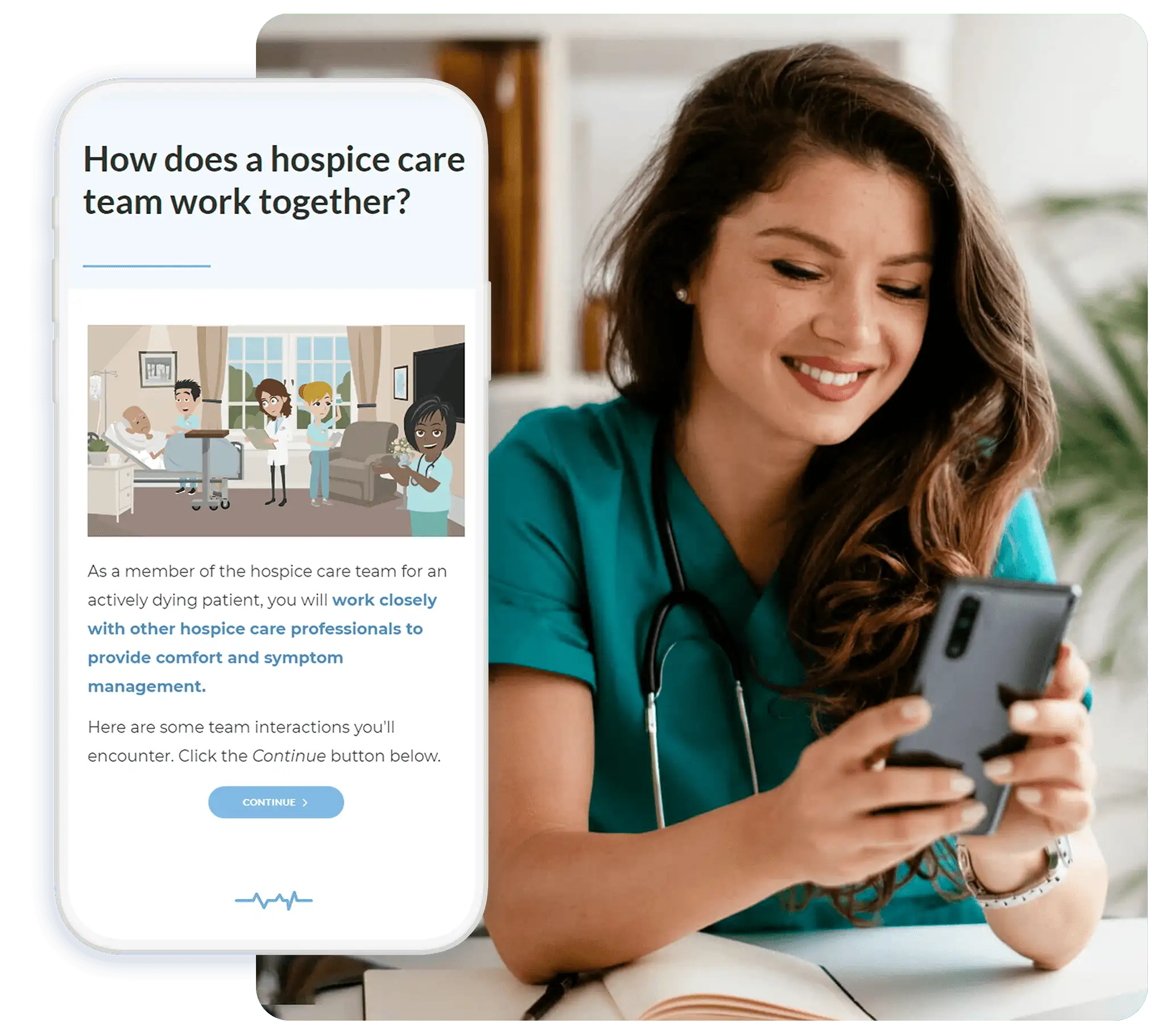Diversity and Culturally Competent Care Training for Home Care
The training on Diversity and Culturally Competent Care for Home Care delves deep into the essence of cultural competence for professionals in home health and home care. It covers a range of critical subjects such as the basics of diversity, the importance of being aware and respectful of different cultures, successful intercultural communication, as well as the practical use of the ADHERE approach. The goal is not only to comprehend diverse backgrounds but to utilize that knowledge for provision of excellent, culturally competent care.
Skills You’ll Learn
- Grasp Key Diversity Concepts: Understand the essential elements of diversity in home care, enhancing interpersonal and professional relationships.
- Value Diversity’s Impact: Recognize how diversity enriches the caregiving experience, leading to improved patient outcomes.
- Identify and Avoid Improper Conduct: Learn to pinpoint and steer clear of inappropriate behaviors in a diverse workplace.
- Master Cross-Cultural Interaction Skills: Develop proficiency in interacting effectively across various cultural backgrounds.
- Implement the ADHERE Method: Apply this structured approach to enhance cultural competence in daily care practices.

Diversity and Culturally Competent Care Training for Home Care Course Description
Introduction to Cultural Competence
How does cultural competence influence healthcare? Dive into the core of cultural competence and its vital role in home health. Here, you’ll explore the intricate tapestry of cultural backgrounds, linguistic nuances, and the importance of cultural sensitivity in patient care.
The Value of Diversity in Home Care
Why does diversity matter? Discover the profound impact of diversity on healthcare outcomes. This section delves into how embracing diversity leads to quality care, better health outcomes, and a more inclusive environment for healthcare providers and patients.

Improper Conduct: Identification and Prevention
What constitutes improper conduct in a diverse setting? Learn to identify and prevent behavior that contradicts the principles of cultural competence. This includes understanding policies and procedures, promoting cultural sensitivity, and respecting individual cultural beliefs.
Cross-Cultural Communications: Bridging the Gap
How do we communicate effectively across cultures? Communication is key in home healthcare. Gain skills in bridging linguistic and cultural gaps, ensuring you can deliver care that respects and understands patient needs and preferences.
Applying the ADHERE Method in Home Care
What is the ADHERE Method, and how do you apply it? ADHERE is a structured approach to enhance cultural competence. This section provides actionable strategies to implement this method in everyday care, improving the overall care experience.

How to Get Started with Diversity and Culturally Competent Care Training for Home Care
Diversity and Culturally Competent Care Training for Home Care is designed for anyone in the home care setting, including nurses, CNAs, home health aides, therapists, and office staff seeking to deliver culturally competent care.
This course is part of a yearly subscription to Continua Learning. Continua Learning delivers over 300 hospice, home health, and home care training courses and in-services in a mobile solution for easy compliance and tracking it all from one place. Contact us to set up a demo for your agency today! Elevate your expertise. Enhance patient satisfaction.

CONTINUA LEARNING
Simplify Your Agency's Compliance Training and Skill Building
A complete solution: more than 350 courses, 500+ CEUs, caregiver in-services, training plans, and more.
Course Features and Outcomes
Diversity and Culturally Competent Care Training for Home Care is built using Continua Learning action and skill-focused training:
- Action-Oriented Learning: Instead of just absorbing information, your staff will practice actions directly contributing to your agency’s success.
- Enhanced Compliance: With real-world scenarios, staff are better prepared for audits, ensuring your agency exceeds compliance standards.
- Engaging & Interactive: Gone are the monotonous click-next formats. Our courses are created with interactive elements that engage and reinforce learning.
- Patient Satisfaction: Real-world action-focused training leads to more competent care, directly impacting patient satisfaction and your agency’s reputation.
Diversity and Culturally Competent Care Training for Home Care Continuing Education
This course offers 1 CEU for nurses, certified nursing assistants, home health aides, and caregivers. Continua Learning is an approved provider of CEUs from the following boards:
- Florida Board of Nursing
- Florida Board Of Occupational Therapy
- Florida Board Of Speech – Language Pathology And Audiology
- Florida Board Of Nursing – Certified Nursing Assistants
Course Reviewer
The course content is reviewed and approved by Margaret (Margie) Fincham, an experienced professional with over 50 years in nursing and business. Margie, a Barnes Hospital School of Nursing graduate of Washington University and California State University, holds BSN, MSN, and GCNS degrees and a BA in Art Administration.
Her extensive background includes:
- Roles in home health care and branch management.
- Development of caregiver courses in English and Spanish.
- Consulting in best practices for patients and clinicians.
She also holds certifications in hospice, home health, and wound care.
Frequently Asked Questions
What is the importance of cultural competence in healthcare?
Cultural competence in healthcare is crucial for ensuring care providers deliver patient-centered services. It involves understanding and respecting patients’ diverse cultural backgrounds, critical to improving health and wellness outcomes and ensuring that care plans are effective and respectful.
How can this course help home healthcare professionals improve health disparities?
By focusing on cultural competence and sensitivity, home care professionals can better understand and respond to the unique needs of diverse populations. This understanding is essential in reducing health disparities and delivering culturally appropriate care, ultimately leading to better patient health outcomes.
What role does cultural competence play in continuing education for home healthcare providers?
Continuing education in cultural competence equips healthcare providers with the necessary knowledge and skills to provide culturally sensitive care. It’s an ongoing process that helps professionals stay informed about diverse populations’ evolving needs and preferences, ensuring high-quality care delivery.
Can cultural competence training aid in communicating with family members of diverse backgrounds?
Absolutely. Cultural competence training includes strategies for effective communication with family members from various cultural and linguistic backgrounds. This ensures that healthcare providers can navigate different expectations about personal space, types of physical contact, and other cultural norms.
How does cultural competence contribute to patient satisfaction and care outcomes?
Cultural competence directly impacts patient satisfaction by ensuring care is respectful and responsive to the cultural needs of patients. This leads to more informed decisions about their care, enhances the care experience, and contributes positively to overall care outcomes.
Is cultural competency training relevant for direct care workers in home health settings?
Yes, cultural competency training is highly relevant for direct care workers in home health. It equips them with the skills to deliver culturally competent healthcare, essential in a home setting where personalized care is paramount, and interactions are often more intimate and continuous.

